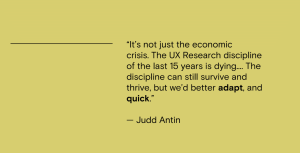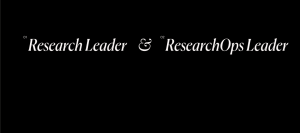Day 1–The Great Research Reset: Shaping the future of research ops: Expanding roles and strategies for a more integrated research ecosystem

— In 2019, I was visiting NYC, one of my favorite cities in the world

— And I came across this design, ‘the future has no format’. This concept is empowering, for despite pandemics and politics, its helpful to hold onto notion that we create our futures
- We participated in creating current research experience, for better and worse, and we are capable of creating future experience as well

— Working on generational framework and Gen 2 of present for Gen 3 of the future, both research and research operations
- To build future we need energy and optimism and some rebellion in some ways

— Put together a poll, but only 11% of researchers are optimistic, where they work in digital transformation or Europe
- But full down optimism is not majority, and results extrapolate to conference audience
— Where you are at, hope this talk leads to creative inspiration and reconcieve power of research and make strategic powerhouse in next five years

— I’ll introduce Gartner’s Hype cycle and rubbish model to capture phases at which new technologies matures
- Unproven, but plainly useful, and good illustration of journey we took
— Pretend we are going back in a time machine to 2010

— Where were you then? What did you career prospects and goals look like? Same size of team around you?
- In context of research and hype cycle

— We were at start of 15 years of rapid growth

— If told you in 15 years, hundreds of companies having research teams, fast emerging disciplines of research ops, lots of purpose tools, grappling with artificial intelligence
- Agreement that research was a must to deliver excellence, and tons of non-researchers want to do research themselves
— You would have gasped in anticipation
- As if we rode to peak of inflated experience

— We are not in trough of disillusionment, but at intersection and tons of things to do and decisions to make, where smarts and creativity are our only limitation
— We can embrace shifting environment and new opportunities and challenges

— New era of collaboration and how research delivers value in organizations
- Three core steps to take
- Redefine the value prop of research
- Take ops first approach to building and rebuilding research practices [ this is not about selling a research-ops professional]
- Get specific to deliver business value
- Let’s break this down

— Doing research is not only value that research practice can provide
- Judd Antin published blog post on research industry that articulated this point

— He said our discipline needed adapt
- True as statement as it could get, and importance of statement

— When companies layoffs workers, they are making a statement on business value

— User research has value proposition problem, as stakeholders are not convinced they need in-house researchers to do research, instead of just using vendors
- Our pitch hasn’t worked so far, and likely won’t in the future
— Need to see things through other people’s eyes

— Researchers and research is expensive, especially if you believe other people can do the research
- Millions of dollars in research on balance sheet, and it’s an asset that would be scrutinized when times are tough

— For example, assume a typical research salary range from $113k to $225k

— Then have a 12-person team with 150k per researcher— reasonably conservative
- Would cost $2,000,000 per year
- Tools and vendors could $500,000
- Also standard overhead costs for bringing human being onboard and 2-3X a person’s salary
— Total cost is around $6.5 million per year

— Might not sound like a lot with revenue in billions, but if researcher delivering value unidirectionally and cost around $500,000 per year, or delivering insights to senior stakeholder and stakeholder fails to use — it’s a problem

— Stakeholder might high five you, and then the case disappears into thin air

— It’s then tricky and not possible, to show ROI and value for money spent on research
- No matter how fantastic it was

— Even if value is delivered, and it can’t be seen, the statement still above still holds
- You should know how much team is costing each year, and strategy so that people who make big ticket decisions experience value at first hand and support company growth
— Money in must lead to more value out

— But how to do this?
- Tying to profit lines is wild goose chase
— We come up of alternative of more research or greater veracity of research

— But more research doesn’t guarantee perceivable value relative to cost for business, and throwing in reops person makes it more expensive

— So what’s solution?
- If you have hammer everything looks like a nail, and your default as a researcher could be to fix everything by more research, more process, similar how UX designers want more design
— We need to do all of things with plan and working together

— You can’t build a skyscraper with a screwdriver alone, no matter how handy it is
- Research can be a skyscraper discipline though

— We know we have toolbox of tools to leverage

— We have
- Tons of methodologies
- Many types of researchers
- Tools and technologies
- ResearchOps
- Knowledge and skills from disciplines like librarians and communication experts
- Tons of vendors around
- Belief in the importance of research

— Research leaders have felt it was their primary job to manage people doing researchers
- We need to reimagine role to something more expansive
— Enable right people to access knowledge they need to make decisions

— In sales, they have concept of a unique selling point, and you have unique ability to create team that meet goal above and something only you can offer
- A whole toolbox of resources to leverage and make it operable

— How do I know which tool to pick when?
- DIY pick-up tool with rubber handles as the tool build for job

— So Part 2 take an ops first approach
- What does it mean though?

— Ops has lots of baggage around it, but incredible how it has grown over past few years and ops seen as thing
- But it’s not buying headcount
— Not a noun though to purchase, but really a verb to decide how team operates for how it delivers value
— It’s a doing, a being

— How you operate defines how team delivers value, and not something to hand over to anyone, including research ops

— But are you throwing your own profession under the bus?

— Ideal world you would have research leader, and ops leader to act as co-conspirator
- Research leaders to outline how org should be structured and deliver value for how it should be prioritized
— Operations should outline how strategy should be brought to life to achieve the gaol
— Two should work in total harmony
- Need to make strategy operable
— If no reops person available, you’d take on this role

— And operations is not optional
- But wait, you think you are doing fine though

— But without a set of explicit decisions to articulate how you define value, you are operating by the seat of your pants

— And run the risk of firefighting, admin whirlwinds, due to lack of clear direction of what focus on and achieve
- Might sound extreme, but this can sneak in without people knowing it

— Leader can say we should build a panel
- But that’s too vague to be a priority
— Lot of work to build and maintain, only for accuracy and value quickly degrade for it

— Leader says we should do more with outputs and re-ops pro builds library with everything in it, but its a lot of value to maintain, and tool to house it is expensive

— It’s the equivalent of designing a spork that is universal for everyone, but sporks fail outside of narrows contexts like backpacking

— Finally, you need to be specific to deliver value

— Strategy as practical and priotized plan in response to challenges and opportunities
- And it must be specific

— Using analogy of stock trading, you need to place right bets, at right time, on the right stocks

— What does this look like in real-life?
- Case study of media company expanding television to daytime TV watchers, a category that covers a wide range of people

— Our job would be to helpe people access knowledge they need to make profitable decisions about daytime tv watchers
- Need to know right people, scope and information they need, a nadit of existing knowledge and designing a solution for a specific set of requirements
- Specificity changes the games entirely

— You can prioritize three methodologies for funding and attention, and predicating types of researchers, participant recruitment
- Category in library, relationships with internal stakeholder and existing internal knoweldge and so much more

— Mix of research practice of what you do and how you do are inseparable

— Research leader says we need X for specific researchers and audiences
- The ops pro builds a system to support this specific goals

— This builds an insights generating engine tuned for daytime tv watcher, which can be re-purposed for other options

— Know have engine to help org figure out important gaols, and gives middle management value, as things that can be touched by billion dollar decision makers in company

— The result? When company cuts eventually comes you don’t look like vaporware

— As practice becomes more systematized, become more efficient, and better able to deliver insight engine across a wide range of priorities

— You can transform research into a strategic powerhouse. To do this.
- Redefine the value proposition of research
- Operations first appraoch and design practice from ground-up
- Specific about how to deliver value to meet orgs specific needs

Q&A
- Top tips for those who joined org as first real research leader?
- Power answer is that what happens most is need to run ahead to get things done, and use research skills to look and understand what’s going on across the org— and use things we spoke about to look at operations to achieve and grander place

